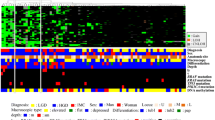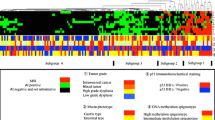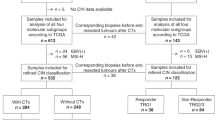Abstract
The stage of gastrointestinal cancers has been correlated with the loss of heterozygosity (LOH) and the presence of microsatellite instability (MSI). This study delineated the category of the extent of LOH and the presence of MSI for the genetic classification of the intestinal-type and diffuse-type gastric cancers that frequently exhibited intralesional heterogeneity. A total of 390 tumor foci from 116 gastric cancers were screened using a panel of 40 microsatellite markers on chromosomes 3p, 4p, 5q, 8p, 9p, 13q, 17p, and 18q. One MSI-positive gastric cancer accompanying a LOH-positive focus and 19 gastric cancers with an intralesional LOH heterogeneity with a similar extent were identified. One hundred and sixteen gastric cancers were categorized based on the presence of MSI (16 cases) and the extent of LOH (100 cases) in a representative focus. A large fraction of MSI-positive cases was found in the intestinal-type (94%), late-onset (mean age 68 years), early-stage (75%) diseases (P<0.05). The diffuse-type gastric cancers with a baseline-level loss involving zero or one chromosome showed a correlation with the earlier onset (mean age 45 years), advanced-stage (81%) diseases (P<0.0001). In both the intestinal-type and diffuse-type gastric cancers, a low-level loss involving 0–3 chromosomes (2–3 chromosomes in the diffuse type) and a high-level loss involving 4–7 chromosomes were predominant in the early (69%) and advanced (86%) stages, respectively (P<0.0001), at similar mean ages of onset (61 years and 65 years). Gastric cancers were categorized into low-risk (MSI and low-level LOH) and high-risk (baseline-level and high-level LOH) genotypes displaying cell-type- and age-dependent oncogenicity.


Similar content being viewed by others
References
Aaltonen LA, Peltomaki P, Leach FS, Sistonen P, Pylkkanen L, Mecklin JP, Jarvinen H, Powell SM, Jen J, Hamilton SR, Peterson GM, Kinzler KW, Vogelstein B, Chapelle A (1993) Clues to the pathogenesis of familial colorectal cancer. Science 260:812–816
Candusso ME, Luinetti O, Villani L, Alberizzi P, Klersy C, Fiocca R, Ranzani GN, Solcia E (2002) Loss of heterozygosity at 18q21 region in gastric cancer involves a number of cancer-related genes and correlates with stage and histology, but lacks independent prognostic value. J Pathol 197:44–50
Chiaravalli AM, Cornaggia M, Furlan D, Capella C, Fiocca R, Tagliabue G, Klersy C, Solcia E (2001) The role of histological investigation in prognostic evaluation of advanced gastric cancer. Analysis of histological structure and molecular changes compared with invasive pattern and stage. Virchows Arch 439:158–169
Choi S-W, Park S-W, Lee K-Y, Kim K-M, Chung Y-J, Rhyu M-G (1998) Fractional allelic loss in gastric carcinoma correlates with growth patterns. Oncogene 17:2655–2659
Choi S-W, Choi J-R, Chung Y-J, Kim K-M, Rhyu M-G (2000) Prognostic implications of microsatellite genotypes in gastric carcinoma. Int J Cancer 89:378–283
Choi S-W, Lee K-J, Bae Y-A, Min K-O, Kwon M-S, Kim K-M, Rhyu M-G (2002) Genetic classification of colorectal cancer based on chromosomal loss and microsatellite instability predicts survival. Clin Cancer Res 8:2311–2322
Chung Y-J, Park S-W, Song J-M, Lee K-Y, Seo E-J, Choi S-W, Rhyu M-G (1997) Evidence of genetic progression in human gastric carcinomas with microsatellite instability. Oncogene 15:1719–1726
Chung Y-J, Kim K-M, Choi J-R, Choi S-W, Rhyu M-G (1999) Relationship between intratumor histological heterogeneity and genetic abnormalities in gastric carcinoma with microsatellite instability. Int J Cancer 82:782–788
Chung Y-J, Choi J-R, Park S-W, Kim K-M, Rhyu M-G (2001) Evidence for two modes of allelic loss: multifocal analysis on both early and advanced gastric carcinomas. Virchows Arch 438:31–38
dos Santos NR, Seruca R, Constancia M, Seixas M, Sobrinho-Simoes M (1996) Microsatellite instability at multiple loci in gastric carcinoma: clinicopathologic implications and prognosis. Gastroenterology 110:38–44
Fishel R, Lescoe MK, Rao MR, Copeland NG, Jenkins NA, Garber J, Kane M, Kolodner R (1993) The human mutator gene homolog MSH2 and its association with hereditary nonpolyposis colon cancer. Cell 75:1027–1038
Greene FL, Page DL, Fleming ID, Fritz A, Balch CM, Haller DG, Morrow M (eds) (2002) AJCC cancer staging manual, 6th edn. Springer Verlag, Berlin Heidelberg New York
Hyun J-S, Jo B-K, Park C-J, Yi J-Y, Lee J-Y, Rhyu M-G (2002) Loss of heterozygosity and PCR artifacts in a microsatellite analysis of psoriasis and colorectal cancer. J Korean Med Sci 17:641–647
Ionov Y, Peinado MA, Malkhosyan S, Shibata D, Perucho M (1993) Ubiquitous somatic mutations in simple repeated sequences reveal a new mechanism for colonic carcinogenesis. Nature 363:558–561
Kim K-M, Kim M-J, Cho B-K, Choi S-W, Rhyu M-G (2000) Genetic evidence for the multi-step progression of mixed glandular-neuroendocrine gastric carcinomas. Virchows Arch 440:85–93
Lasko D, Cavenee W, and Nordenskjold M (1991) Loss of constitutional heterozygosity in human cancer. Annu Rev Genet 25:281–314
Lauren P (1965) The two histological main types of gastric carcinoma: diffuse and so-called intestinal-type carcinoma. Acta Pathol Microbiol Scand 64:31–49
Luinetti O, Fiocca R, Villani L, Alberizzi P, Ranzani GN, Solcia E (1998) Genetic pattern, histological structure, and cellular phenotype in early and advanced gastric cancers: evidence for structure-related genetic subsets and for loss of glandular structure during progression of some tumors. Hum Pathol 29:702–709
Martin L, Assem M, Piard F (1999) Are there several types of colorectal carcinomas? Correlations with genetic data. Eur J Cancer Prev 8:S13–S20
Ming SC (1977) Gastric carcinoma. A pathobiological classification. Cancer 39:2475–2485
Nagel S, Borisch B, Thein SL, Oestreicher M, Nothiger F, Birrer S, Tobler A, Fey MF (1995) Somatic mutations detected by mini- and microsatellite DNA markers reveal clonal intratumor heterogeneity in gastrointestinal cancers. Cancer Res 55:2866–2870
Nio Y, Tsubono M, Kawabata K, Masai Y, Hayashi H, Meyer C, Inoue K, Tobe T (1993) Comparison of survival curves of gastric cancer patients after surgery according to the UICC stage classification and the general rules for gastric cancer study by the Japanese Research Society for gastric cancer. Ann Surg 218:47–53
Rhyu M-G (1998) Genetic events underlying morphological complexity of gastric carcinoma. J Korean Med Sci 13:339–349
Sepulveda AR, Wu L, Ota H, Gutierrez O, Kim JG, Genta RM, Graham DY (2000) Molecular identification of main cellular lineages as a tool for the classification of gastric cancer. Hum Pathol 31:566–574
Shiao YH, Bovo D, Guido M, Capella C, Cassaro M, Busatto G, Russo V, Sidoni A, Parenti AR, Rugge M (1999) Microsatellite instability and/or loss of heterozygosity in young gastric cancer patients in Italy. Int J Cancer 82:59–62
Shiu MH, Perrotti M, Brennan MF (1989) Adenocarcinoma of the stomach: a multivariate analysis of clinical, pathologic and treatment factors. Hepatogastroenterology 36:7–12
Stemmermann GN, Brown C (1974) A survival study of intestinal and diffuse types of gastric carcinoma. Cancer 33:1190–1195
Thibodeau SN, Bren G, Schaid D (1993) Microsatellite instability in cancer of the proximal colon. Science 260:816–819
Weinberg RA (1991) Tumor suppressor genes. Science 254:1138–1146
Wu MS, Lee CW, Shun CT, Wang HP, Lee WJ, Sheu JC, Lin JT (1998) Clinicopathological significance of altered loci of replication error and microsatellite instability-associated mutations in gastric cancer. Cancer Res 58:1494–1497
Yustein AS, Harper JC, Petroni GR, Cummings OW, Moskaluk CA, Powell SM (1999) Allelotype of gastric adenocarcinoma. Cancer Res 59:1437–1441
Acknowledgements
This study was supported by Ministry of the Health and Welfare grant 'HMP-99-M-03–0001' and Korea Science and Engineering Foundation grant '971–0710–090–2'.
Author information
Authors and Affiliations
Corresponding author
Rights and permissions
About this article
Cite this article
Kim, KM., Kwon, MS., Hong, SJ. et al. Genetic classification of intestinal-type and diffuse-type gastric cancers based on chromosomal loss and microsatellite instability. Virchows Arch 443, 491–500 (2003). https://doi.org/10.1007/s00428-003-0840-0
Received:
Accepted:
Published:
Issue Date:
DOI: https://doi.org/10.1007/s00428-003-0840-0




